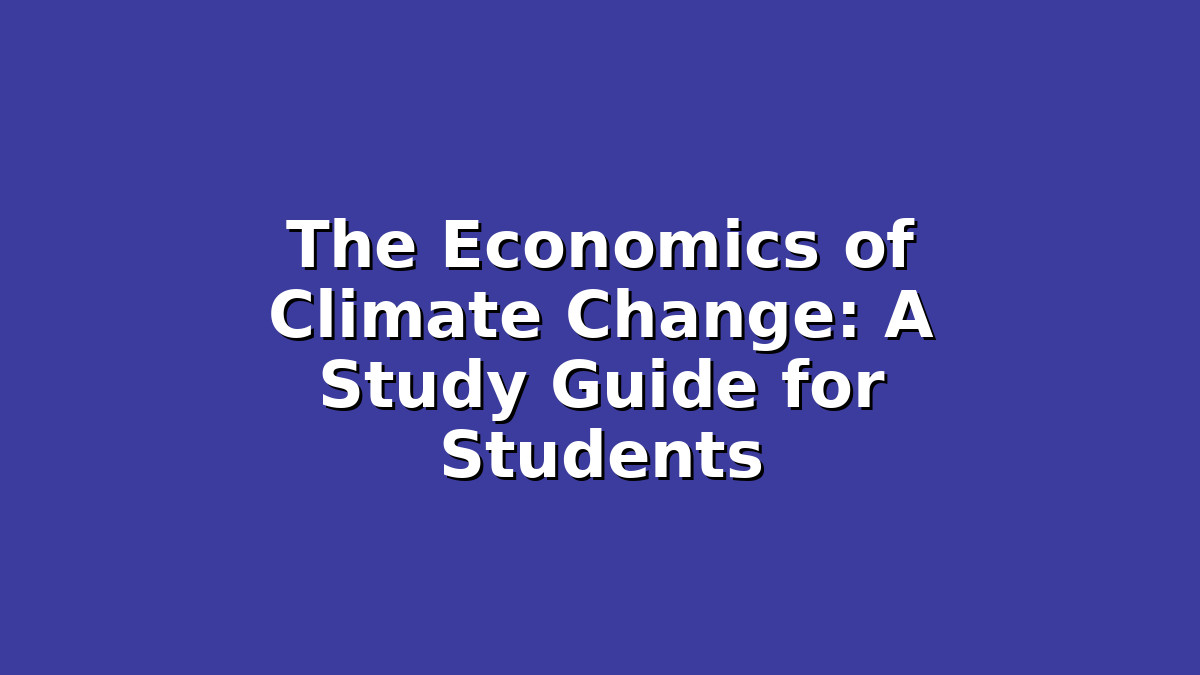Climate change is one of the most urgent challenges facing our world today, and understanding its economic implications is crucial—especially for students preparing for exams in economics, environmental science, or related subjects. The economics of climate change explores how economic activities contribute to environmental issues and how policies, markets, and innovations can help mitigate or adapt to climate impacts. This topic can feel complex, but with the right approach and study strategies, you can master it confidently.
In this article, we’ll break down the economics of climate change into manageable sections and provide effective study tips to help you succeed. Whether you’re preparing for exams or simply aiming to deepen your understanding, these insights and strategies will be valuable.
—
1. Understanding the Basics: What Is the Economics of Climate Change?
The economics of climate change involves analyzing how human economic activities—like industry, transportation, and agriculture—affect the environment, and vice versa. It also examines policies designed to reduce greenhouse gas emissions and the costs and benefits associated with these actions.
Key Concepts to Focus On:
– Externalities: Climate change is a classic example of a negative externality where the costs of pollution are not borne by the polluters but by society at large.
– Market Failures: Because environmental costs are often not reflected in market prices, governments may need to intervene.
– Cost-Benefit Analysis: Evaluating the economic trade-offs of climate mitigation policies.
– Carbon Pricing: Mechanisms like carbon taxes or cap-and-trade systems that aim to reduce emissions by assigning a cost to carbon dioxide.
Study Tip:
Create flashcards for these core concepts and definitions. Use diagrams, such as supply and demand curves showing negative externalities, to visually cement your understanding. Drawing and labeling these from memory can be a powerful exam prep method.
—
2. Economic Impacts of Climate Change: Costs and Risks
Climate change doesn’t just affect the environment—it has real economic consequences worldwide. Increasing temperatures, rising sea levels, and extreme weather events can disrupt economies by damaging infrastructure, reducing agricultural productivity, and increasing health risks.
Important Areas to Study:
– Direct Economic Costs: Damage to property, increased insurance claims, and infrastructure repairs.
– Indirect Costs: Loss of labor productivity, migration, and social unrest.
– Sectoral Impacts: How climate change affects agriculture, fisheries, energy demand, and tourism.
– Global Inequality: Developing countries often face greater risks and have fewer resources to adapt.
Study Tip:
Make a summary table categorizing the economic impacts by type (direct vs. indirect) and sector. Use real-world examples from recent climate events to illustrate these points—this not only helps retention but strengthens your essay or exam answers with concrete evidence.
—
3. Policy Responses and Economic Solutions: What Can Be Done?
Governments and international bodies use various economic tools to combat climate change. Understanding these policies and their effectiveness is essential for a well-rounded view.
Key Policy Instruments:
– Carbon Taxes: Charging emitters for their carbon emissions to incentivize reductions.
– Emissions Trading Schemes: Caps on total emissions with tradable permits.
– Subsidies for Green Technology: Encouraging renewable energy and energy efficiency.
– Regulations and Standards: For example, fuel efficiency mandates for vehicles.
Economic Theories and Approaches:
– The “Polluter Pays” Principle: Making those responsible for pollution internalize the cost.
– Innovation Economics: How investments in green technology can lead to both environmental and economic benefits.
– Sustainable Development: Balancing economic growth with environmental protection.
Study Tip:
Practice writing short essays or bullet-point arguments discussing the pros and cons of different policies. Try explaining these policies aloud as if teaching someone else — this technique, called the Feynman Method, can deepen your comprehension and improve your exam communication skills.
—
Conclusion: Mastering the Economics of Climate Change
The economics of climate change is a vital and dynamic subject that blends environmental science with economic theory and policy analysis. For students, grasping this topic means understanding complex interactions between human activity and the environment, and the economic tools available to address the challenge.
To succeed in your exams:
– Break down the topic into clear concepts.
– Use visual aids and real-world examples.
– Practice explaining ideas in your own words.
– Stay updated with recent climate policy developments for current examples.
Remember, this is not just about passing exams—it’s about equipping yourself with knowledge to contribute to future solutions. Stay curious, stay organized, and tackle your studies step by step. You’ve got this!
—

Responses